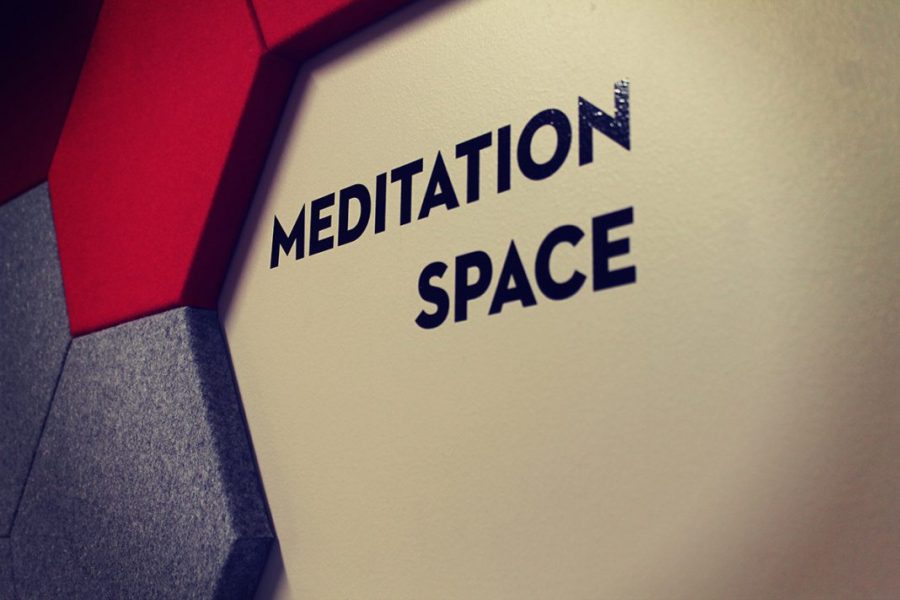Short of receiving a midterm three weeks into the semester, nothing is more terrifying than the extensive list of mundane tasks assigned to students each week. Between academics, employment, hobbies and relationships, there is plenty of reason to become overwhelmed. Looking for a solution that does not reduce you to a tumultuous night at PKE? The University of Utah is one step ahead, offering a full suite of mediation services for students and faculty.
On January 25, the Ray A. Olpin Union opened its “Meditation Space,” which is open to all students for mindfulness and prayer. Located on the third floor of the Union by the Parlors, the Meditation Space was established with the intention of slowing down the rapid pace of life. This space is the newest addition to the university’s mindfulness repertoire, as the Counseling Center offers a wide array of mental health services that focus on the breath. Rapid development at the university cloaks the importance of the decision to open the Meditation Space. Within a bustling education township, the opportunity to bridge the gap between the body and mind is highly valuable.
How does mindfulness — and specifically meditation — offer immense results where other practices and therapies disappoint? The father of Meditation-Based Stress Reduction (MSBR), Dr. Jon Kabat-Zinn, created a nationally recognized program based on the practice at the University of Massachusetts Medical School. “Mindfulness, often being spoken of as ‘the heart of Buddhist meditation,’ and being primarily about the systematic training and refinement of attention and awareness, compassion and wisdom, is a manifestation of its universal applicability,” reads the UMASS website. Mindfulness encourages thoughtful observation for each moment of one’s daily life. The ability to simply let go of fear in the future and past is developed, creating a sense of stillness in the present moment.
Mindfulness ends the automatic routine of existing and replaces that system with a connection between the body and mind.
The practice of mindful awareness brings the mundane aspects of life to a grinding halt. Assuredly the “body and mind” disconnect sounds like a ridiculous distinction, right? Yet, if one thinks about the time spent brushing teeth or driving a car, it is hard to recall every detail. The mind often wanders and chooses to focus on circumstances that are completely out of our control. Those with anxiety know this reality best when one reaches a state of inaction for fear of the impending future. That is why mindfulness is so effective — observing the mind often results in a lessening of worries.
Suddenly, life switches from mindlessness to mindfulness.
Aside from the Meditation Space, there is a host of other resources on campus. Every “Mindful Monday” at 12:30 PM there is a free meditation session held in room 344 of the Student Services Building. The service is completely free for all students and faculty and requires no signup or registration. Each session is led by a facilitator who works as a clinician for the University Counseling Center (UCC). Furthermore, the UCC offers a series of workshops which teach students how to cope with anxiety and depression.
The University also launched a new center in May 2017 named C-MIIND that is dedicated to health care through mindfulness and integrative behavioral health interventions. The center oversees $17 million worth of research funding, which will provide greater analysis into the therapies that can be used in “primary care clinics, hospitals, community mental health centers and addiction treatment facilities.”
One does not need to venture far to find a place to peacefully reflect mindfully. Meditation is a skill that is built over time, and the entry point is accessible to anyone. All one needs is a silent area, a few minutes of time, and a little patience. Sit in a comfortable position and begin to breathe through the nose, focusing on the breath passing in and out. Focus on that motion and allow the thoughts — which will inevitably arise — to pass through. Once you notice yourself wandering, bring the attention back to the breath.
The U has invested immensely into mindfulness — perhaps there is nothing better than slowing down to take a breath.
@TheChrony


